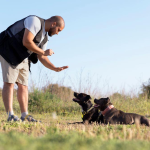According to the American Kennel Club, large dog breeds are considered senior canines when they turn six. On the other hand, smaller pups can be called old when they are seven years old and older.
However, there are other signs you should look out for that show your canine friend is entering their golden years. These signs also indicate that you should consider switching to wet dog food, which is often more beneficial to senior dogs.
These signs include the following:
Decreased sensory abilities, particularly difficulties seeing and hearing impairment:
- Joint stiffness
- Dental issues
- Weight changes
- Greying fur
- Reduced energy
- Behavioural changes, including increased anxiety and confusion
Although these signs may make you anxious since you need to deal with several changes as your pet enters their golden years, you should keep your spirits up. You can still ensure they stay happy and healthy, spend plenty of time and share wonderful memories with them even when they reach this stage.
A Guide To Feeding Senior Dogs
Good nutrition is crucial for senior dogs since it helps them stay healthy. As they age, their metabolism slows down and when they become less active, they will require fewer calories but more high-quality nutrients, which they should get from their food.
Proper nutrition can also prevent or help your pet manage age-related conditions like arthritis, diabetes, and kidney disease.
When your pet reaches their golden years, you should also ensure they have a balanced diet to keep their joints healthy, boost their immune system and manage their weight. At this stage, your dog will benefit from foods rich in antioxidants, omega-3 fatty acids, and fibre.
So, how can you ensure your senior dog stays well-fed and gets the nutrients they need at their age? Follow these feeding tips:
- Choose the right dog food.
Once your pet reaches their golden years, your vet may recommend feeding them senior dog food. These products are specially formulated to meet your pet’s new nutritional needs and eating habits.
Senior dog foods are rich in high-quality protein, antioxidants and fatty acids. However, they contain less calories and are easy to chew and digest.
If your pet has dental problems and does not drink enough water daily, it is best to feed them wet dog food. This type of dog food contains water, helping your canine friend increase their water intake and stay hydrated.
Moreover, wet dog food is soft, making it easy for canines with missing teeth and other dental issues to chew and swallow it.
You can also give your canine friend dry dog food which helps lessen plaque and remove tartar from their teeth. However, you need to add water to the kibbles to soften them to ensure your pet chews them without difficulty.
Keep in mind that you can also try mixed feeding to switch things up from time to time. Add a few softened kibbles on top of your pet’s wet food for additional texture.
If you are unsure how to feed your senior canine, your vet can recommend dog food products that meet your pet’s nutritional requirements and best feeding practices.
- Serve your pet warm or room-temperature food.
Food served warm or at room temperature tastes and smells better for dogs, even if their olfactory and gustation senses are affected by age.
If you want to ensure your pet eats during mealtimes, take their food out from the fridge two hours before feeding them. You can also warm it in the microwave, but avoid overheating it and giving it to your pup immediately since it could burn their mouth.
Since taste and smell play a crucial role in whetting your dog’s appetite, you need to store their kibbles in an airtight container in a clean, dry area in your pantry to maintain its flavour and appetising aroma.
- Keep an eye on portion size.
If your senior pet is now less energetic, they are burning less calories. Feeding them more than the recommended amount of food daily may cause them to gain unnecessary weight.
To avoid this, read the label and follow the guidelines regarding the amount of food to give your dog or ask your vet to ensure you are feeding them correctly. Make sure you follow the recommendations by portioning your pet’s food during mealtimes.
Consult your vet if you notice your dog develops a healthy appetite and want to adjust the amount you give them.
You might also have an easier time feeding your senior canine if you give them small portions several times throughout the day instead of loading their bowls twice a day.
- Make mealtimes enticing for your pet.
Some older dogs may prefer eating alone, so change their dining area if their current one is a bit noisy and busy. Find a quiet spot in your home where they can eat at their own pace.
If you have other pets at home, separate your senior dog from them during mealtimes so they can eat without interruptions.
If your canine friend has arthritis, invest in a slightly raised feeding bowl so they won’t have to bend to eat their food, which can hurt their joints.
- Ensure your dog is sufficiently hydrated.
Even if you are feeding your senior pet wet dog food, you still need to ensure they are hydrated so that they stay healthy and keep their energy up.
Water helps regulate your dog’s body temperature by carrying heat away from their body. It also aids their digestion and lubricates their joints.
Many ageing dogs tend to forget to drink, which is why you should help your canine friend avoid this. Start by keeping their drinking bowls clean and full of fresh water. Take note of water left in the bowl at night to see if they are drinking more or less daily.
During hot days, add a few ice cubes to your pet’s water bowl so they can drink something cool and refreshing.
You can also consider investing in a dog water fountain if your senior canine likes running water.
Remember to bring a water bottle for your pet so they can drink and stay hydrated when you go out for a walk or play with them outdoors.
As your dog enters their golden years, expect many changes in their bodies and behaviour. Remember to be patient and flexible as you deal with your senior dog’s new diet and eating habits so you can help them enjoy a good quality of life and enjoy their remaining years.







